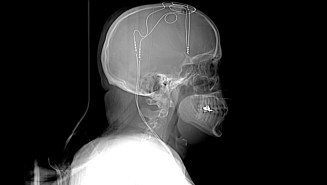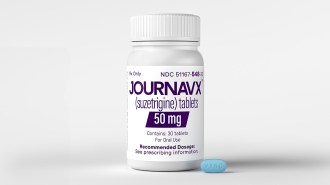Health & Medicine
-
 Health & Medicine
Health & MedicineA second version of bird flu is infecting cows. What does that mean?
While the risk to humans of exposure from cows or milk remains low, this new flu spillover from birds into cows raises the need for continued surveillance.
-
 Health & Medicine
Health & MedicineSleeping pills may have unexpected effects on the snoozing brain
As scientists unravel how sleep benefits the body, a study in mice is highlighting the potential pitfalls of using Ambien and other sleep aids.
-
 Health & Medicine
Health & MedicineToxic dangers lurk in LA, even in homes that didn’t burn
Urban wildfires like LA’s make harmful chemicals from burning plastics and electronics that can make indoor air dangerous for months.
-
 Health & Medicine
Health & MedicinePlastic shards permeate human brains
A study of microplastics and nanoplastics in brains shows an astonishing increase over time.
-
 Health & Medicine
Health & MedicineWelcome to The Deep End, a new podcast about brain implants and depression
This new six-part podcast follows the lives of people with severe depression who volunteered for deep brain stimulation.
-
 Health & Medicine
Health & MedicineA new kind of non-opioid painkiller gets FDA approval
The new drug, called Journavx, is a non-opioid for treating short-term moderate to severe pain.
-
 Neuroscience
NeuroscienceScratching an itch is so good, and so bad
The motion kicks off inflammation but may also combat harmful bacteria
-
 Health & Medicine
Health & MedicineBetter male birth control is on the horizon
Men have two birth control options: condoms and vasectomies. Why has it taken so long to develop more contraceptives?
-
 Health & Medicine
Health & MedicineCan you actually die of a broken heart?
Death by heartbreak doesn't just happen in stories. In real life, severe stress can cause the sometimes-fatal takotsubo syndrome.
-
 Animals
AnimalsFever’s link with a key kind of immunity is surprisingly ancient
When sick, Nile tilapia seek warmer water. That behavioral fever triggers a specialized immune response, hinting the connection evolved long ago.
-
 Health & Medicine
Health & MedicineTrump is withdrawing the U.S. from WHO. Here’s what that means
When Trump’s move to leave WHO takes effect in a year, it may gut funding for global public health and limit U.S. access to crucial data, experts warn.
By Meghan Rosen -
 Health & Medicine
Health & MedicineCigarettes with less nicotine may help some smokers quit
The U.S. Food and Drug Administration issued a rule to drastically reduce the amount of nicotine in cigarettes and other combusted tobacco products.